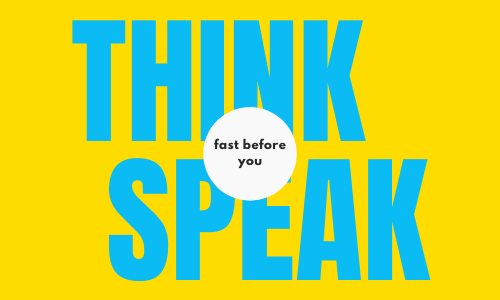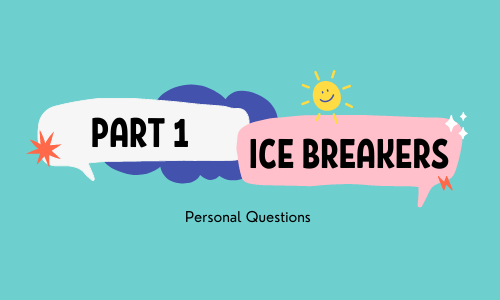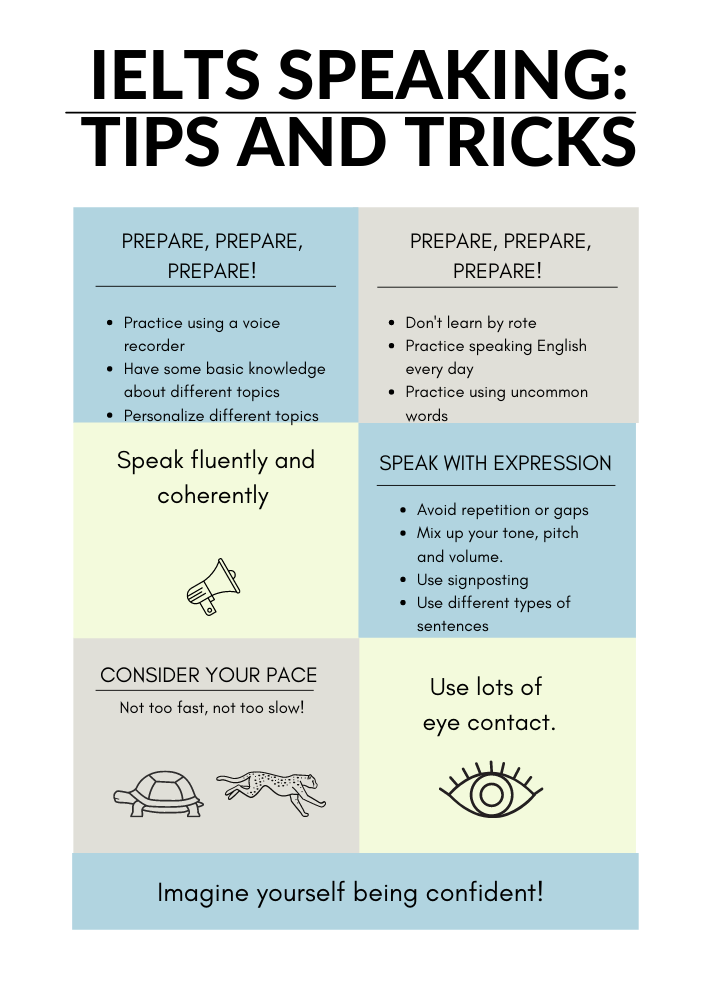
Worried about your IELTS Speaking test?
The IELTS Speaking test is a daunting challenge for any non-native speaker. It is conducted to test your speaking ability and through the test, the examiner gain insight into whether you are fluent enough. The test lasts for about 15-20 minutes with questions based on a variety of topics. The Speaking test becomes successful if you are able to impress upon the examiner your mastery over the English language.
Most importantly, there is no right or wrong answer as the aim is not to test your general knowledge, but your speaking ability.

The test consists of two sections:
In the first section, the examiner enquires after your personal details like asking you to give an introduction about yourself, enquiring why you chose a particular job, your various interests- details meant to put you at ease.
The next section deals with general questions where you would be asked to give opinions, share thought processes about a particular subject, critically analyze a situation, relate incidents in connection to a topic etc.
Criteria for judgment:
- Fluency and coherence
- Lexical resource
- Grammar
- Pronunciation
You must show the examiner that you can:
• speak at length and use a range of linking words (Fluency and Coherence)
• discuss a variety of topics and use some less common and idiomatic vocabulary (Lexical Resource)
• use a range of complex structures with some flexibility (Grammar)
• use a range of pronunciation features and be easy to understand (Pronunciation)
The speaking test comprises of
- General questions on familiar and personal topics
- A 2-minute speech based on a cue card (personal or general topic)
- A discussion on abstract ideas.
Speaking Part 1

Here the examiner will ask you a few personal questions like:
“Are you working or studying?”
“What are your strengths?”
“What is your favourite colour?”
The common mistake that students make in a speaking test is that they give a short answer to such questions without giving any reasons. Remember to give a full answer with reasons to any questions that they ask. So, while practicing, try to talk for a longer period of time covering all bases like the who, why and how.
For eg. If the examiner asks you if you work or study, you can elaborate your answers by talking about what you are studying, why you chose the particular subject, who inspired you and what you hope to be after gaining the qualification etc.
Most importantly, they will for sure ask you about your job or studies and you can prepare these answers in advance.
After that, the examiner will ask you a few questions on a specific topic (for eg: arts, movies or animals)

Speaking Part 2
In part 2, the examiner will give you a cue card and you will have to speak for 2 minutes based on the topic given in the cue card. You will be given 1 minute to prepare. You can write notes as well during that 1 minute.

Speaking Part 3
This is the most important part of the speaking test. Here you get to interact with the examiner as if you are having a real conversation. This is where you get the opportunity to showcase your language ability. Examiners pay close attention to your part 3 performance to decide on your band score.
Of course, there are some skills you can develop to breeze through those Part 3 questions:
- Making general statements or inferences from what you see around you
For eg. How do people in your country feel about protecting historic buildings?
From all that I see and hear, people seem to be very vociferous about protecting their heritage but unfortunately, there are very few who actively participate in campaigns to stop them from being demolished.
- Using Opinion Adverbs like Certainly, Maybe, Perhaps, Personally, Definitely, undoubtedly etc.
For eg. Do you think people should have to pay to visit historic buildings?
Personally, I believe that everyone should be allowed free entry, so that all can learn and gain first-hand knowledge of a collective past.
- Using signals
For eg. What are the problems town planners face when dealing with buildings of historic importance?
I think the main issue is cost, and whether it will cost more to renovate a building than to simply knock it down.
- Expressing opinions in a natural style with the use of phrases like In my opinion…, I feel that…, I would say that…, It seems to me that…, As I see it…, Well if you ask me… etc.
Who should be given exclusive rights for the maintenance of old buildings?
Well, if you ask me, I would go for the government as they would exhibit a moral responsibility towards the country and the people and thus take the side of preserving our heritage. Private players, on the other hand, may take undue advantage of these historic buildings to fill up their own pockets.
- Make predictions
For eg. What do you think is in store for historic buildings in the future?
In a land where the population growth is booming, I seriously doubt whether the priority would be on preserving historic buildings. I believe that most buildings would be pulled down to make way for housing projects…
- Using conditional clauses to predict the future
For eg. Do you think town centres will change?
If there’s a continuous rise in online buying and selling, the town centres will have to serve on a whole new capacity. It can be changed to recreation centres or spaces where people can just meet up, talk and hang out…
- Start comparing which allows for a wider range of conversation
For eg. Elaborate on the benefits of living in a town.
Undoubtedly, the facilities available in a town make it a better place to live, unlike a village where one has to travel miles to reach a hospital, a supermarket etc.

Strategies for preparation:
- Have some basic knowledge: It’s important to know about certain topics that might be asked at the exam beforehand. In our classes, we will familiarize you with all the past exam questions and other topics that they are most likely to ask.
- Personalize the situation. Talking about personal experiences gives a natural touch to your speech.
For eg. When asked about topics like a music band or a museum, think of one which you would like to hear or visit.
If asked about a writer, even if you do not know anything about one, you can make up a story. There is no requirement in IELTS to say the truth. You can even choose a fictitious writer’s name and talk about a book that you read at school.
- Use the 1 minute that you get for cue cards effectively. Make notes and you should practice a lot on how to move from one point to another without repeating anything. Signpost every points and use linking words and complex sentences.
- Don’t learn by rote but you can be prepared for questions regarding your life and other details. Questions like where you come from, what are your hobbies, personal likes and dislikes etc. will surely be asked. Be prepared with the appropriate vocabulary and pronunciation to describe your job, studies etc. For every answer, there may be follow up questions, so think carefully about what you are about to say.
- Practice speaking English every day, in front of the mirror, friends, colleagues etc. every chance that you get. Surround yourself with English so much that you live and breathe the language.
- Record your speeches and go over it with a fine comb. Correct your mistakes and re-record it until you get it right. Doing this everyday along with a friend or partner like a 30 day speaking challenge would bring about a tremendous improvement in your level of speaking.
- Be confident in front of the examiner because it gives the impression of your level of comfort with the subject. The introductory questions are meant to put you at ease, so be calm and don’t get carried away by stress.
- Practice with cue cards for ielts because that would be the longest you would have to talk about a specific topic. Note down the points preferably in a large hand so that you could easily refer to it in between. Cue card topics are easily available in the internet for anyone to refer to.

- Don’t memorize complex words you are unfamiliar with. This would, instead of fetching marks, bring the score down as there is a greater chance of wrong usage and mispronunciation.
- Like all other skills, practice makes perfect. Get your hands on all the test materials and speaking ielts sample question papers that you can, and work them out thoroughly. This would help build confidence as you would have an idea about what the questions would be and how to answer them. Ielts speaking sample questions pdf are available for free to download form various websites.
- Don’t rush in with your answers. Do take the time to pause and think over the matter before answering the ielts speaking tasks. Jumping in without thinking will land you on the wrong foot.
- Vocabulary in ielts plays a huge role in making answers sound impressive, but don’t use complicated sentences which would give away your weakness. Whatever complex word or phrases that you use, remember to familiarize yourself with it.

In the end, the only thing that will bring you a Band 8 or 9 is the level of motivation and commitment you display. Following these tips needs consistency and dedication and the more you practice, the sooner you reach your goal.
Remember Speech is power; it persuades, it compels. You just have to use the Right Word at the Right Time….


